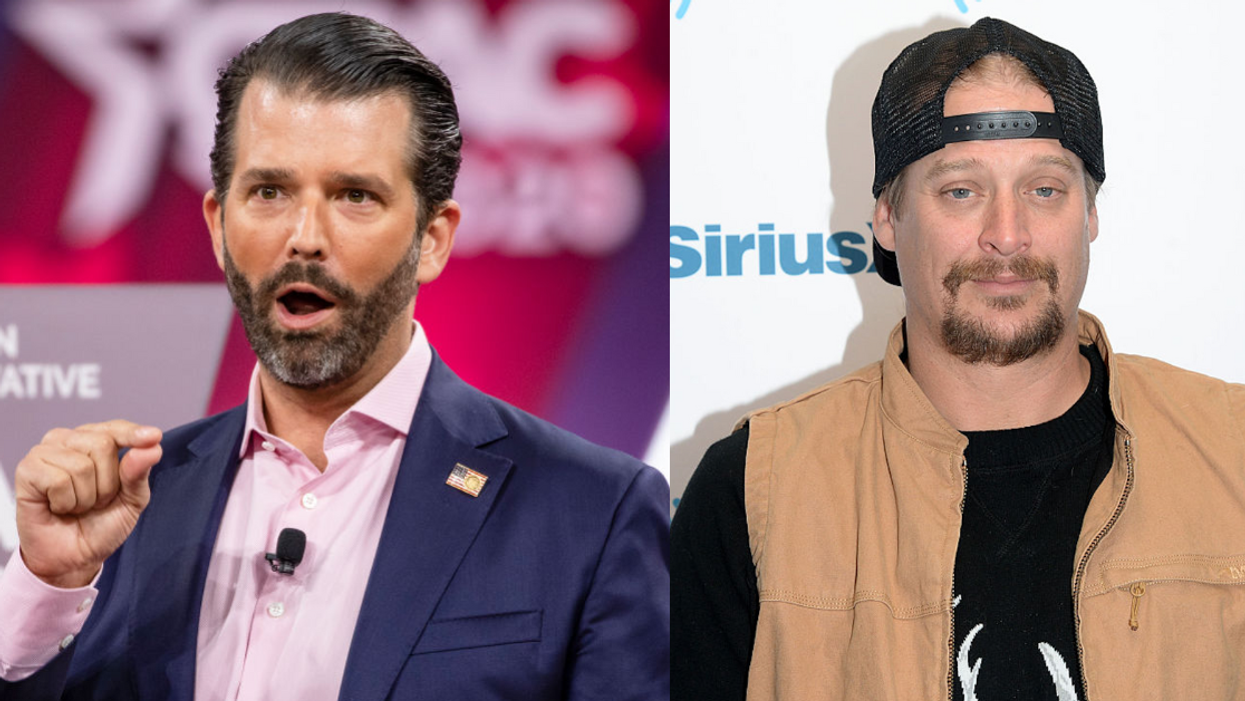Donald Trump Jr. was mocked online after Russian trolls tricked him into sharing a post from a fake Instagram account that had been made to look like it belonged to musician Kid Rock as part of an effort to influence the United States midterm elections.
The account, @KidRockOfficial, was the brainchild of Russia's Internet Research Agency—also known as the Glavset—which is engaged in online propaganda and influence operations on behalf of Russian business and political interests.
A new report released this week by the social media tracking firm Graphika and Stanford University’s Internet Observatory reveals a @KidRockOfficial account on the far-right social media network Gab—which federal agents identified as being run by Russian trolls in 2020—was operated by the same group that controlled other accounts under that name on right-wing social media platforms like Gettr and Truth Social—which is owned by former Republican President Donald Trump.
A piece in Rolling Stone on the report's findings notes the fake Kid Rock accounts were so effective at spreading online misinformation they even convinced Donald Trump Jr. to post a screenshot of a conspiratorial post about gas prices and the debunked COVID-19 cure Ivermectin that was originally posted on Gettr to his personal Instagram.
Trump Jr. commented simply "Yup" in response to the fake post that you can see via his Instagram below.
Graphika and Stanford researchers said the Russian troll network engaged in a “deliberate effort to capitalize on public concerns about foreign interference in U.S. elections,” noting that they linked the "official" Kid Rock account on Gettr to the Glavset when they discovered an identical account on Gab.
Accounts in this network sarcastically identified themselves as "Russian trolls" just ahead of the midterms, at the same time that Russian oligarch Yevgeny Prigozhin—who had long denied his role in Russian interference in U.S. elections—publicly admitted his role in such operations, saying they would continue.
The Russian trolls, researchers said, used their operation to generate support for far-right candidates like Kari Lake, the QAnon adherent and election denier who was the Republican nominee in Arizona's gubernatorial race. They also employed it to push conspiracy theories about Russia's ongoing war in Ukraine, justifying Russian President Vladimir Putin's "special military operation."
The news that Trump Jr. had fallen for content from a Russian troll farm prompted social media users to mock him profusely.
That someone as high profile as Trump Jr. was fooled only underscores the reality of the problem with Russian troll farms and influence campaigns.
According to Tyler Williams, director of investigations at Graphika, the Russians are using fake personas "to imitate, infiltrate, and attempt to influence a specific online community" which they then use to "coordinate across multiple platforms to amplify division and exacerbate existing tensions."
Williams added that these accounts "mostly scream into an echo chamber on the fringes of the online conversation" and that they consistently "struggle to achieve sustainable reach" despite "claims to the contrary by the actors themselves."














 @DuncanCecil/X
@DuncanCecil/X @@realDonaldTrump/Truth Social
@@realDonaldTrump/Truth Social @89toothdoc/X
@89toothdoc/X @xray_media/X
@xray_media/X @CHRISTI12512382/X
@CHRISTI12512382/X
 @sza/Instagram
@sza/Instagram @laylanelli/Instagram
@laylanelli/Instagram @itssharisma/Instagram
@itssharisma/Instagram @k8ydid99/Instagram
@k8ydid99/Instagram @8thhousepath/Instagram
@8thhousepath/Instagram @solflwers/Instagram
@solflwers/Instagram @msrosemarienyc/Instagram
@msrosemarienyc/Instagram @afropuff1/Instagram
@afropuff1/Instagram @jamelahjaye/Instagram
@jamelahjaye/Instagram @razmatazmazzz/Instagram
@razmatazmazzz/Instagram @sinead_catherine_/Instagram
@sinead_catherine_/Instagram @popscxii/Instagram
@popscxii/Instagram
